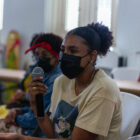El Centro de Periodismo Investigativo (CPI) solicitó al Tribunal Supremo de Puerto Rico que le permita participar como amigo de la corte para apoyar con sus argumentos a periodistas demandados de Noticentro de WAPA TV, en un caso que considera trascendental para el “privilegio del reportero” y su deber ético de protección de las fuentes de información. “Debido a nuestra práctica haciendo periodismo investigativo, el CPI quiere ser escuchado por el Tribunal para dejarle ver la importancia de la protección de este privilegio tan neurálgico para el periodismo y para nuestras aspiraciones democráticas como país. La protección de las fuentes es un deber profesional al que nos obligan los códigos de ética para periodistas en Puerto Rico, Estados Unidos e internacionalmente”, dijo Carla Minet, directora ejecutiva del Centro.
La solicitud para someter un amicus curiae radicada con el apoyo de la Clínica de Asistencia Legal Facultad de Derecho Universidad Interamericana de Puerto Rico, se refiere al caso del fiscal Ildefonso Torres Rodríguez versus Noticentro de Puerto Rico, en el cual el funcionario exige que los periodistas Alex Delgado y Yesenia Torres revelen quién fue la persona que les hizo llegar un documento que usaron en su reportaje y que era parte de una pesquisa del Negociado de Investigaciones Especiales. “La controversia no estriba en si la fuente tenía la autoridad de divulgar el documento, sino si se puede obligar al periodista a revelar la identidad de tal persona con quien tenía un compromiso de confidencialidad. Desde los Pentagon Papers… hasta Deep Throat y Watergate…, y el más reciente Telegram chat en Puerto Rico, han sido los esfuerzos periodísticos los que históricamente han informado al público sobre lo que estaba ocurriendo a sus espaldas”, señala parte de la petición de intervención del CPI.
El llamado “privilegio del reportero”, o sea la protección de la identidad de las fuentes de información utilizadas por el periodista en su labor investigativa, forma parte de su función de informar a la ciudadanía.










